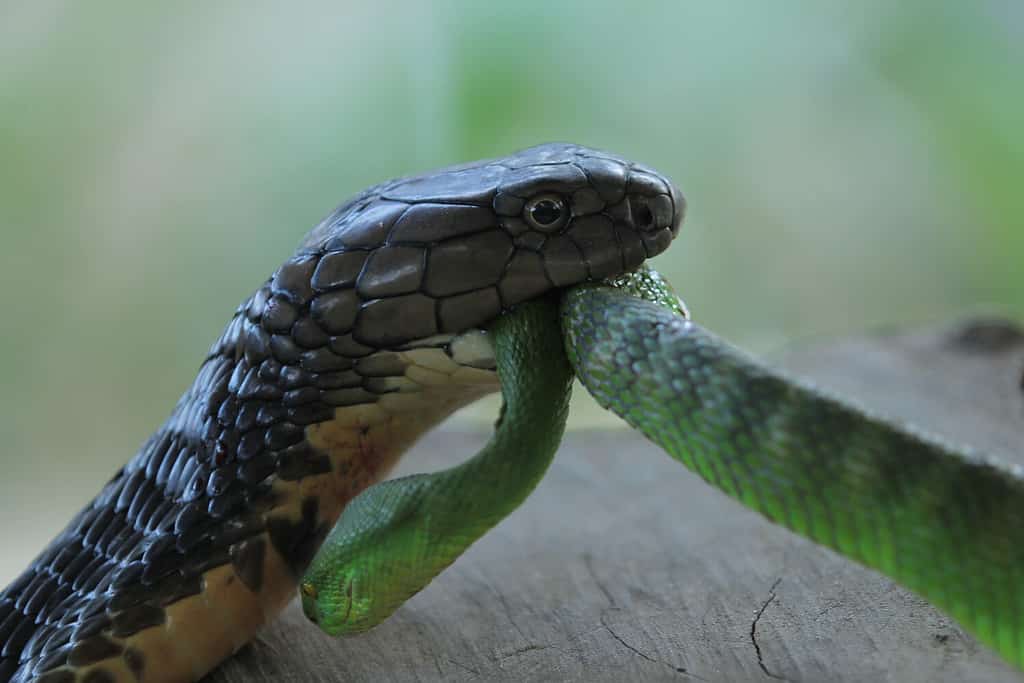- Exotic animal collections are difficult to insure and require specialized policies.
- Insuring a deadly (or any other) snake is expensive, but provides protection against unforeseen circumstances.
- Owning exotic animals like venomous snakes means that you need to take extra precautions for their safety and that of the people who visit you.
In case you ever wondered, the short answer is: Yes. You can insure a deadly snake, or any snake for that matter. However, as with many things in our modern world, there’s more to it than calling up your local State Farm agent and purchasing a policy. As it turns out, there are very few insurance companies that insure exotic animal collections of any species.
Why You Should Insure a Deadly Snake (or Any Snake)
In our increasingly litigious society, we have access to insurance for everything including accidents, health, life, and liability. If you own anything or keep animals, some form of insurance is a wise move that protects you and your family financially.
In the case of snakes and other reptiles, insuring them against both theft of the animal and if that animal bites and injures someone protects everyone involved. Here are a few more reasons you should insure your collection, whether you own deadly or venomous snakes or a harmless Kenyan sand boa:
- Extreme weather or natural disasters. What if a tornado rips through your home or an earthquake knocks over your enclosure, shattering the glass and accidentally releasing your pet cobra?
- Escapes. Snakes are known escape artists and if you don’t have a secure lock, they will get out.
- Bites and other Injuries. Snakes, like other animals, will bite under the right circumstances. Some snakes can do real damage.
- Theft. Several species and special morphs of snakes are extremely expensive – we are talking in the tens of thousands of dollars and up.
- Show and performing animals. Obviously, reptiles can only be trained so far. However, companies and educational organizations that exhibit snakes in public shows need liability insurance.
Even a small harmless snake can be unpredictable, so an insurance policy offers peace of mind. There are likely many more reasons you may consider insuring your reptile collection, whether you have venomous or nonvenomous snakes.
Which Species Can Be Insured?
Typical pets like dogs and cats are pretty easy to insure. Many homeowners and renters insurance may include coverage for dog bites and other things pertaining to liability or injury involving your pets. However, the same cannot be said of exotic animals like zebras, elephants, and snakes — venomous or not.
There are a few specialized insurance companies offering policies for every species from aardvarks to zebras, while others specialize in only a few different species. These agencies provide custom-designed insurance policies that protect people and organizations from potential liability and other unforeseen circumstances.
Determining What Laws You Must Follow
Every state, county, and even city in the United States has different laws and regulations that must be followed for you to keep some species. For example, Ohio and Florida require an insurance bond to cover liability. Other localities may have similar regulations, or they may have very few — it is also possible that the animal you would like to keep is not legal where you live.
It’s your responsibility to research and know which laws you must follow.
How Much Does It Cost to Insure a Deadly Snake?
Here is where it gets interesting! These are not your five-dollar-a-month policies that you can purchase in five minutes online. Insuring snakes – dangerous and otherwise – requires at least one conversation with an expert insurance agent who can help you decide what you need. In fact, you’ll probably have several conversations while you gather the documentation they need.
According to Mitchel Kalmanson of the Lester Kalmanson Agency in Florida, policies start at $5,000 with a $25,000 limit and go up from there. He looks at several variables that affect the cost and coverage of the insurance policy.
Although there are many variables to consider, here are a few things you’ll need to consider and discuss with your agent:
- How many snakes do you have?
- Are they venomous or nonvenomous?
- Which species do you keep?
- Do you have all of the licenses required by your city or state?
- Are you a private individual or an organization?
- Are your snakes pets or do you show them publicly or are they used in movies?
- Do you have any special education or training?
- What sort of enclosures, locks, and other equipment do you have?
- Do you have written instructions for anyone who has to care for them in an emergency?
- Can you move them in an emergency?
- Do you travel with the animals?

Insuring your
King Cobra
may be more expensive than you expected, but a qualified insurance professional can help.
©Mufti Adi Utomo/Shutterstock.com
What About Insurance Deductibles?
As with other insurance policies, they don’t pay everything. You’ll have to pay a deductible if you have to file a claim. So, it becomes about more than the insurance policy cost for your snakes or other exotic animals, you also have to consider the deductibles, and whether you can afford them.
Policies underwritten by the Lester Kalmanson Agency typically have deductibles starting at $12,500. According to Mr. Kalmanson, they won’t exceed $17,500 deductibles and require proof that you can pay it, should the need arise.
Do You Need Insurance?
In the end, whether you insure your collection is a personal choice, albeit expensive. However, an expensive policy is better than the consequences should one of your exotic animals seriously injure someone. To make an informed decision, be sure to contact an agent.
The photo featured at the top of this post is © Eric Isselee/Shutterstock.com
Discover the "Monster" Snake 5X Bigger than an Anaconda
Every day A-Z Animals sends out some of the most incredible facts in the world from our free newsletter. Want to discover the 10 most beautiful snakes in the world, a "snake island" where you're never more than 3 feet from danger, or a "monster" snake 5X larger than an anaconda? Then sign up right now and you'll start receiving our daily newsletter absolutely free.
Thank you for reading! Have some feedback for us? Contact the AZ Animals editorial team.






